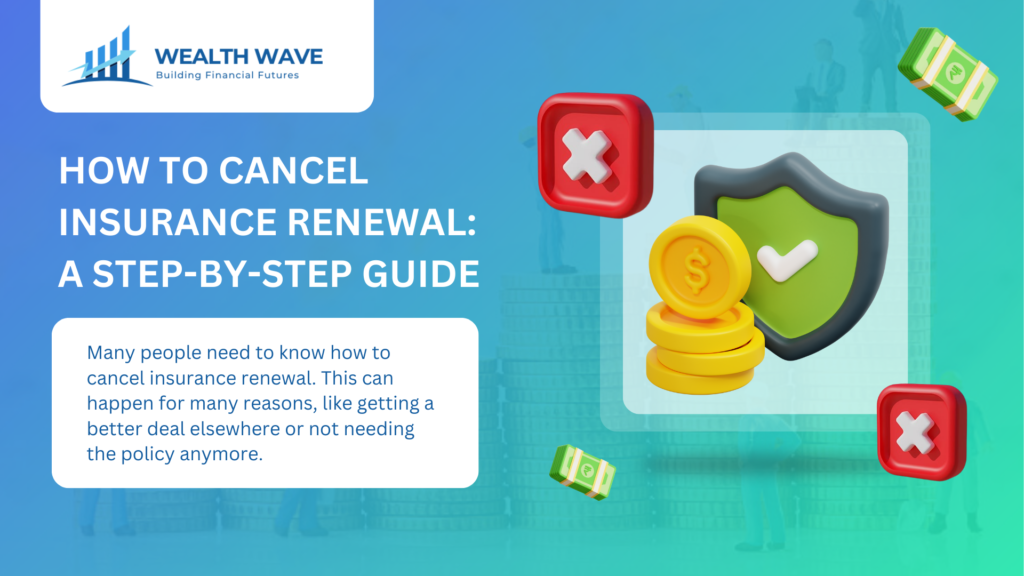Many people need to know how to cancel insurance renewal. This can happen for many reasons, like getting a better deal elsewhere or not needing the policy anymore. Knowing the correct way to end your current coverage is crucial.
One important fact is that you must contact your insurer directly to stop your policy.
This article will guide you through each step needed to terminate car insurance effectively. You’ll learn when it’s best to cancel, how to do it without trouble, and what comes after cancellation.
Plus, we cover essential points to keep in mind before making this big decision. Get ready for clear instructions on stopping coverage smoothly.
Key Takeaways
- To stop your car insurance, talk to your insurer and give them important details like your policy number and when you want the cancellation to happen.
- You might get money back for the time you did not use your insurance. Always check if you can get a refund after canceling.
- Make sure you have another insurance policy set up before ending the current one. This prevents any gaps in coverage that could cause problems later.
- Canceling insurance can affect how much you pay for future policies. Keep this in mind and make decisions carefully.
- Some companies ask for a signed form to end your policy. Know what steps your insurer needs so you can avoid extra fees or issues.
When to Cancel Your Car Insurance

There are key times to end car insurance. If you move, sell your car, or find a better deal, it may be time to cancel.
Moving to another state
Moving to another state often requires canceling car insurance. Each state has different laws and coverage requirements. This means a policy that worked in one place may not fit in another.
Policyholders should contact their current insurer to discuss termination of coverage. Most major insurance companies ask for a conversation with an agent before allowing cancellation.
When canceling auto insurance, it is crucial to provide the policy number and the desired cancellation date. Refund eligibility may also apply if premiums were paid in advance. Some insurers might need a signature on a cancellation form as part of the process.
Understanding these steps can help avoid penalties while ceasing car insurance effectively.
No longer owning a car
It’s essential to provide the policy number, state the intent to cancel, and mention the effective date of cancellation.
Some insurers may need a signed cancellation form from the policyholder. This action helps avoid any penalties or fees linked with ending coverage. Customers should ensure they follow their agency’s procedures and know their carrier’s requirements for terminating auto coverage.
Seeking a better deal
Exploring options for better rates is a smart move. Many drivers seek a better deal on their car insurance. They often find lower premiums with different companies or policies. Finding the right provider can help save money without losing coverage.
Terminating your current policy may be necessary to switch plans. Contact your insurer to cancel the existing policy first. Be ready to provide your policy number and intent to cancel.
This may require an agent’s assistance, as most major insurers need this step for termination. The effective date of cancellation should also be confirmed during this process. Refund eligibility can depend on how payments were made, so discuss that too while terminating coverage.
Wanting to reduce coverage
Reducing coverage may be a valid reason to terminate insurance renewal. Some policyholders choose to do this if they feel they no longer need full protection. This could happen after paying off a car or getting a safer vehicle.
To cease car insurance, it is vital to contact the current insurer first. Insurers often require speaking with an agent for cancellation. Policyholders should provide their policy number and state their intent to cancel clearly.
If refunds are applicable, asking for them during this conversation can help clarify the next steps in the insurance cancellation process.
Being covered under someone else’s policy
Being covered under someone else’s policy can affect the decision to cancel insurance renewal. If a person is now included on another individual’s car insurance, they may consider ending their own policy.
In this case, it is crucial to contact the current insurer. Most major companies require an agent for cancellation. The individual should state their policy number and intent to cancel clearly.
It might be necessary for the policyholder to sign a cancellation form to complete the process. Understanding specific agency procedures and carrier requirements is important before moving forward.
This ensures proper handling of any potential refunds or impacts on one’s insurance record after stopping coverage.
Steps to Canceling Car Insurance

To cancel car insurance, one must first shop for a new policy if needed. Next, contact the current insurer and confirm all cancellation details.
Shopping for a new policy (if needed)
Shopping for a new policy is a key step before ending current coverage. Policyholders may need to find better options or meet new needs. It is wise to compare plans and prices. Many online tools can help with this process.
Contacting insurance agents helps clarify details. Most major insurance companies require speaking directly with an agent to cancel existing policies. If needed, the current insurer’s cancellation procedures should be reviewed carefully.
This ensures smooth termination of coverage without gaps or penalties.
Contacting your current insurer
Contacting the current insurer is a key step in canceling car insurance. Policyholders must reach out to their insurance company directly. Most major insurers require a conversation with an agent to cancel the policy.
It is essential to provide important details such as the policy number, intent to cancel, and effective date of cancellation. Request any potential refunds during this call.
Some companies may need a signed cancellation form from the policyholder. Each agency has its procedures for ending vehicle insurance, so it’s crucial to know their specific requirements beforehand.
Occasionally, online cancellation may also be possible; checking with the provider will clarify this option.
Confirming cancellation details
Confirming cancellation details is an important step. Policyholders must clearly state their policy number and intent to cancel the auto insurance. It is crucial to mention the effective date of cancellation.
They should also request information about any refunds they may receive.
Most major insurance companies need policyholders to discuss their cancellation with an agent. Some insurers might require a signature on a cancellation form as part of ending the policy.
Knowing the agency’s specific procedures for ceasing insurance renewal helps avoid issues down the line.
What to Expect After Canceling Car Insurance

After canceling car insurance, there may be effects on the driver’s insurance record. A driver could also receive a refund for any unused premium.
Potential impact on insurance record
Canceling an auto insurance policy can affect the driver’s insurance record. Policyholders should know that their records may show this cancellation. Most major insurance companies require agents to discuss cancellations, which adds documentation to the record.
If a driver cancels their policy and then seeks a new one, it might change how insurers view them. Some may see frequent changes as risky. There is a possibility of higher rates in the future if the cancellation appears on their record.
Understanding these impacts is vital before stopping car insurance coverage. Next, consider what happens after canceling car insurance.
Refund eligibility
The potential impact on insurance records can affect refund eligibility. Most insurers will refund any unused premiums when a policyholder cancels their auto insurance. Policyholders should reach out to their current insurer to find out if they are eligible for a refund after cancellation.
Insurers may require the policyholder’s signature on a cancellation form. This step ensures that the cancellation is legal and binding. Also, customers can check if they have paid monthly for their coverage, as this can influence the amount refunded.
Knowing these details helps smooth the process of ending an auto insurance policy properly.
Alternative coverage options
Alternative coverage options can help during the transition from a canceled policy. Policyholders may seek new insurance to fill any gaps in their coverage. They can shop for a new auto insurance plan that fits their needs and budget.
Some insurers allow online cancellations, making it easier to switch plans.
Before canceling car insurance, individuals should confirm there are no lapses in coverage. This ensures they remain protected while switching policies. Finding out about any potential refunds is also crucial after ending an existing policy.
Each insurer has different rules regarding cancellation procedures and refunds, so it’s wise to check with them directly.
Important Factors to Consider Before Canceling Car Insurance

Check your coverage needs for the future. Make sure you do not have a gap in coverage. Know how it can affect claims in the future. Ensure that you cancel properly to avoid fees. These factors matter, so reading more will help make an informed decision.
Adequate coverage for future needs
Adequate coverage is key for future needs. Before canceling a policy, one must ensure they have the right protection. This is crucial to avoid gaps in insurance. A lapse in coverage can lead to problems down the line, such as claim denials.
It may also affect the person’s insurance record.
Consider what type of coverage will be necessary after terminating car insurance. New circumstances might arise that require different or additional protection. Planning ahead helps in making smart choices about auto insurance options going forward.
Finding suitable alternatives will guide decisions on ending retirement renewal smoothly.
Avoiding a lapse in coverage
Cancelling a car insurance policy can lead to gaps in coverage. A lapse in coverage may cause problems later, like higher rates or difficulties getting new insurance. Policyholders should ensure they have a new policy ready before ending their current one.
This step helps avoid any period without protection.
Insurance companies often check for lapses when calculating premiums. It is wise to understand the procedures of your agency and carrier requirements for cancellation. Taking care in this process can help maintain good standing and avoid penalties while discontinuing car insurance.
Navigating claim denialsClaim denials can happen after a policyholder submits a request. Many people do not know how to deal with this issue. Understanding the reasons for denial is crucial. Insurers may deny claims due to insufficient coverage or mistakes in paperwork.
Reviewing the policy before filing a claim helps avoid these problems. If a claim gets denied, it’s important for the policyholder to contact their insurance agent. They should ask about specific reasons for the denial and what steps they can take next.
Keeping detailed records of all communications aids in addressing any issues that arise with claims or cancellations.
Properly canceling your policy to avoid penalties
Properly canceling your policy helps avoid penalties. Policyholders must contact their current insurer to end auto insurance. Many major insurance companies require a conversation with an agent for cancellation.
It is important to provide the policy number and state the intent to cancel clearly. The effective date of cancellation should also be mentioned.
Some insurers may need a signed cancellation form before processing the request. Most policies require the policyholder’s signature for legal cancellation. Understanding agency procedures is vital in this process.
Some laws regarding car insurance cancellation may apply, so it’s wise to check them too. Policyholders who pay monthly can still terminate coverage without issues, as long as they follow proper steps to ensure everything goes smoothly during this transition.
Conclusion

Canceling an insurance renewal is easier than it seems. Start by reaching out to your current provider. Make sure to have your policy number ready. State clearly that you want to cancel and ask about any refunds.
Knowing the rules can save time and prevent problems later on. Taking these steps will help ensure a smoother transition as one moves forward with their coverage choices. click here to read more https://wealthwave.money/how-to-renew-insurance-online-a-complete-guide/
FAQs
1. How do I stop my insurance renewal?
To discontinue your insurance renewal, you’ll need to follow a step-by-step guide on how to cancel an insurance policy.
2. Can I end my auto insurance policy?
Yes, you can terminate your auto insurance by following the steps for ceasing an auto insurance policy or stopping vehicle coverage.
3. What does it mean to revoke my insurance renewal?
Revoking your insurance renewal means that you are choosing not to continue with the automatic extension of your current policy.
4. Is there a way to halt my car’s coverage plan?
Yes, by following a guide on how to abort or halt an auto-insurance renewal process, you can cease the continuation of your car’s coverage plan.
5. What is involved in ending my insurance renewal?
Ending or discontinuing your policy involves contacting your insurer and informing them about terminating the ongoing contract before its next term.






